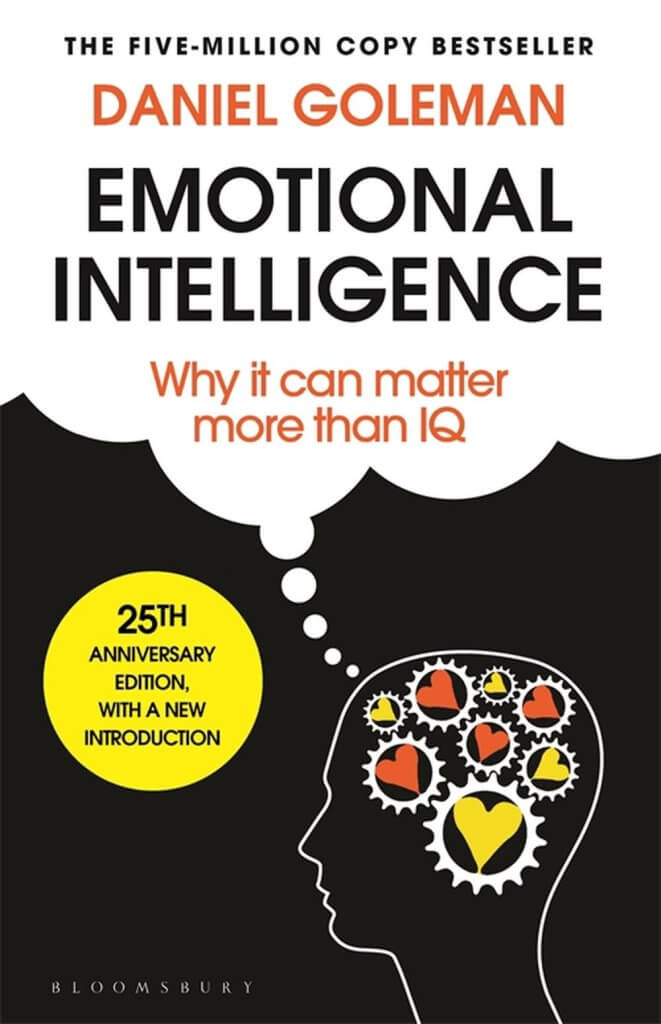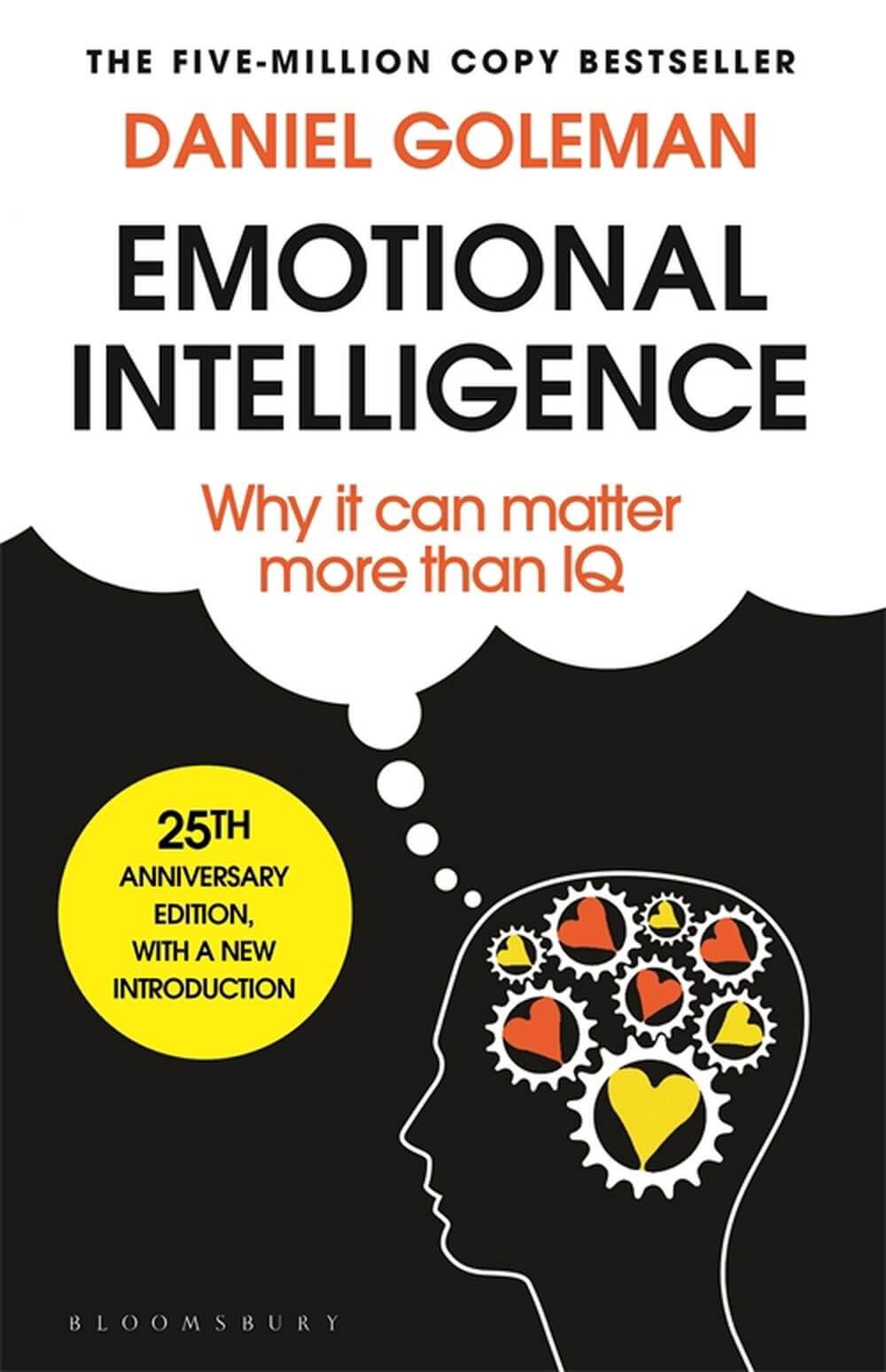
Introduction
Ever wondered why some people with high IQs struggle while those with average scores thrive? It’s a conundrum explained by psychologist Daniel Goleman in his best-selling book, “Emotional Intelligence: Why It Can Matter More Than IQ“.
This blog post dives into the meat of the book, summarizing its key concepts and shedding light on how emotional intelligence plays a pivotal role in our success and happiness. Get ready – it’s time to redefine intelligence.
Key Takeaways
- Emotional intelligence, defined as the ability to recognize and manage our own emotions while understanding and influencing the emotions of others, plays a crucial role in success and happiness in life.
- Emotional intelligence goes beyond IQ and encompasses skills such as self – awareness, empathy, motivation, and social grace. It accounts for 80% of our success in life according to research.
- Developing emotional intelligence brings benefits such as improved self-awareness and self-regulation, enhanced empathy and social skills, better stress management techniques, and resilience in the face of adversity.
- Daniel Goleman’s book explores the role of emotions in decision-making, highlights five main aspects of emotional intelligence (self-awareness, self-regulation, empathy, social skills, motivation), and discusses how emotional intelligence impacts relationships and communication.
Understanding Emotional Intelligence
Emotional intelligence, defined as the ability to recognize and manage our own emotions while understanding and influencing the emotions of others, is crucial for success and happiness in life.
Definition of emotional intelligence
Emotional intelligence, as defined in Daniel Goleman’s groundbreaking book, is the ability to identify, understand and manage our own emotions and those of others. It goes beyond IQ, encapsulating skills such as self-awareness, empathy, motivation and social grace – key factors that account for 80% of our success in life according to research.
Emotional intelligence serves as a guiding light that allows us to navigate complex emotional landscapes within ourselves and interpersonal relationships effectively. With it comes higher self-esteem and the firm belief that any goal can be attained.
Therefore, redefining human intelligence necessitates acknowledging its critical role alongside traditional measures like IQ.
Importance of emotional intelligence in success and happiness
Emotional intelligence plays a crucial role in our success and happiness, often even more so than IQ. While traditional intelligence measures our cognitive abilities, emotional intelligence focuses on understanding and managing our emotions and the emotions of others.
Research shows that IQ only accounts for 20% of our achievements in life, leaving the remaining 80% to non-IQ factors like luck, social class, and emotional intelligence.
Having a high level of emotional intelligence brings numerous benefits. It allows us to navigate through challenging situations with ease by helping us regulate our own emotions effectively.
This self-awareness enables us to better understand our strengths and weaknesses, leading to improved decision-making skills.
Moreover, emotional intelligence enhances empathy and social skills, enabling us to build meaningful relationships with others. By recognizing and understanding other people’s feelings, we can respond appropriately and connect on a deeper level.
Key Concepts in Daniel Goleman’s Book
Daniel Goleman’s book explores the role of emotions in decision-making, highlights the five main aspects of emotional intelligence, and discusses how emotional intelligence impacts relationships and communication.
The role of emotions in decision-making
Our emotions play a significant role in the decision-making process. Daniel Goleman explores this concept in his book, “Emotional Intelligence: Why It Can Matter More Than IQ.” Emotions can influence how we perceive situations, how we evaluate options, and ultimately, the actions we take.
Research has shown that our emotions often guide our decision-making more than logic and reasoning alone.
When faced with a decision, our emotions can provide valuable insights and help us consider factors beyond just rationality. For example, if you’re considering a career change but feel anxious about leaving your current job’s stability, your emotional response – fear or reluctance – might signal the need to explore further before making a hasty decision.
Emotional intelligence allows us to understand and manage these feelings effectively.
By developing emotional intelligence skills such as self-awareness and self-regulation, we become better equipped to navigate through challenging decisions. Understanding our own emotions helps us decipher their underlying causes and make conscious choices instead of reacting impulsively or based solely on immediate gratification.
Emotional intelligence empowers us to approach decision-making holistically by considering both logical analysis and emotional insights.
The five main aspects of emotional intelligence
Emotional intelligence consists of five key aspects that are crucial for personal growth and success. These aspects, as outlined by Daniel Goleman in his book “Emotional Intelligence: Why It Can Matter More Than IQ,” provide a framework for understanding and developing emotional intelligence. Let’s explore these aspects:
- Self-awareness: This is the foundation of emotional intelligence. It involves recognizing and understanding one’s own emotions, strengths, weaknesses, values, and beliefs. Self-awareness allows individuals to have a clearer sense of who they are and how their emotions impact their thoughts and actions.
- Self-regulation: Emotional self-regulation involves managing one’s emotions effectively. It includes the ability to control impulses, manage stress, adapt to changing situations, and stay calm in challenging circumstances. Self-regulation enables individuals to make rational decisions rather than being driven solely by their emotions.
- Empathy: Empathy is the ability to understand and share the feelings of others. It involves being aware of other people’s emotions, perspectives, and needs. Empathetic individuals can connect with others on a deeper level, build strong relationships, and exhibit compassion and understanding.
- Social skills: Social skills refer to the ability to interact effectively with others. This includes communication skills, conflict resolution abilities, networking capabilities, teamwork skills, and leadership qualities. Strong social skills enable individuals to build lasting relationships, collaborate successfully with others, and navigate social situations with ease.
- Motivation: Motivation refers to our drive to achieve our goals and aspirations despite challenges or setbacks. Individuals with high emotional intelligence are self-motivated and resilient; they have a strong sense of purpose that propels them forward even when faced with obstacles.
The impact of emotional intelligence on relationships and communication
Developing emotional intelligence can have a profound impact on our relationships and communication skills. When we possess high emotional intelligence, we are better able to understand and navigate the emotions of others, leading to more meaningful connections and successful interactions.
Our ability to empathize with others’ experiences and perspectives allows us to communicate effectively and resolve conflicts in a constructive manner. Moreover, emotional intelligence enables us to regulate our own emotions during challenging situations, preventing unnecessary misunderstandings or hurt feelings.
By prioritizing emotional intelligence in our relationships and communication, we can cultivate healthier connections that promote mutual respect, understanding, and overall satisfaction.
The Benefits of Developing Emotional Intelligence
Developing emotional intelligence offers a range of benefits, including improved self-awareness and self-regulation, enhanced empathy and social skills, as well as better stress management and resilience.
Improved self-awareness and self-regulation
Developing emotional intelligence brings about numerous benefits, including improved self-awareness and self-regulation. When we are more emotionally intelligent, we gain a deeper understanding of our own emotions and how they impact our thoughts and actions.
This increased self-awareness allows us to recognize our triggers and patterns, enabling us to better navigate difficult situations. Moreover, it enables us to regulate our emotions effectively, preventing impulsive reactions that may harm ourselves or others.
By developing these skills, we become more in tune with ourselves, leading to greater control over our emotional responses and ultimately enhancing our overall well-being.
Enhanced empathy and social skills
Developing emotional intelligence leads to enhanced empathy and social skills. When we are more in tune with our own emotions, we become better able to understand the feelings and perspectives of others.
This increased empathy allows us to connect on a deeper level, building stronger relationships and fostering a greater sense of understanding. In addition, as we improve our emotional intelligence, our social skills naturally develop alongside it.
We become more adept at navigating social situations, recognizing cues and effectively communicating with others. This not only enhances our personal relationships but also contributes to success in professional settings where strong interpersonal skills are highly valued.
Better stress management and resilience
Improving emotional intelligence can have a profound impact on our ability to manage stress and build resilience. When we develop a greater understanding of our emotions and how they affect us, we become better equipped to handle the challenges and pressures that life throws at us.
Stress is an inevitable part of life, but it is our response to stress that determines its impact on our well-being. Emotional intelligence helps us to recognize and regulate our emotions, which in turn allows us to respond more effectively to stressful situations.
By being aware of our emotional triggers and learning healthy coping mechanisms, we can reduce the negative effects of stress on both our mental and physical health.
Resilience, on the other hand, refers to our ability to bounce back from setbacks and adapt in the face of adversity. Developing emotional intelligence improves resilience by helping us cultivate a positive mindset, build stronger relationships, and maintain a sense of optimism even in difficult circumstances.
With higher levels of emotional intelligence, we are better able to navigate life’s challenges with grace and determination.
Conclusion and Review of “Emotional Intelligence: Why It Can Matter More Than IQ”
In conclusion, “Emotional Intelligence: Why It Can Matter More Than IQ” by Daniel Goleman shines a light on the often overlooked but crucial aspect of emotional intelligence. This groundbreaking book challenges traditional notions of intelligence and highlights the importance of understanding and developing our emotions for success and happiness in life.
With practical insights and guidance, Goleman provides readers with a roadmap to enhance their emotional intelligence and navigate the complexities of relationships, decision-making, and personal growth.
A must-read for anyone seeking to unlock their full potential!
FAQs
1. What is emotional intelligence and why does it matter?
Emotional intelligence refers to the ability to recognize, understand, and manage our own emotions as well as the emotions of others. It matters because it plays a crucial role in our personal and professional success, influencing our relationships, decision-making abilities, and overall well-being.
2. What are some key insights from Daniel Goleman’s book “Emotional Intelligence: Why It Can Matter More Than IQ”?
In his book, Daniel Goleman explores how emotional intelligence can be more important than traditional measures of intelligence like IQ. He delves into topics such as self-awareness, empathy, social skills, and self-regulation while providing scientific research and real-life examples to support his claims.
3. How can I improve my emotional intelligence?
Improving your emotional intelligence involves developing self-awareness by identifying your own emotions and their triggers. It also includes practicing empathy by understanding others’ perspectives and practicing active listening. Developing effective communication skills and managing stress are also essential components of enhancing emotional intelligence.
4. Is emotional intelligence something that can be learned or developed?
Yes! While some individuals may naturally possess higher levels of emotional intelligence, it is a skill set that can be learned and developed over time through practice and conscious effort. By engaging in activities like mindfulness exercises, reflective journaling, seeking feedback from others, and participating in interpersonal skills training programs, individuals can enhance their emotional intelligence abilities for greater personal growth and success.





